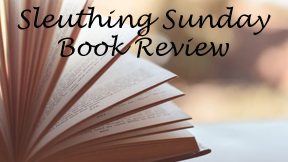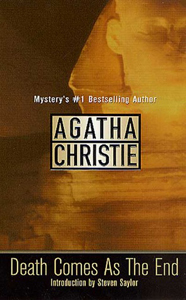Settling in for a comfortingly familiar Agatha Christie novel, I was surprised to find that “Death Comes as the End” (1944) is something quite different. Set in ancient Egypt, it’s her first novel not contemporaneous to the time of its writing.
A taste of the culture
Christie was an amateur scholar of Egypt and regularly vacationed there – as one would guess from her several novels set in the Middle East. “Death Comes as the End” perhaps started as a challenge of sorts to herself.
It ends up being rather great – and remarkably accessible. Sure, the primary narrator – young widow Renisenb – has a name I pronounced as gibberish in my head. But ultimately we understand the practices that are odd to us are normal to the era, such as the ritualistic burials in chambers carved out of cliffsides. The chambers include items the person will want in the next life.

“Death Comes as the End” (1944)
Author: Agatha Christie
Genre: Historical mystery
Setting: Thebes, Egypt, about 2000 B.C.
Also, it’s not at all wrong in the characters’ minds to use slaves to test food and drink for poisons. And the idea that there are “men’s tasks” and “women’s tasks” define the culture – although, interestingly, the wives of Imhotep’s sons sometimes tiptoe toward questioning this notion.
Things that define one’s society are automatically normal, Christie understands. 1944 England and 2021 America include many things an outside observer would find odd. It’s all relative.
Modern parallels
One commonality between Christie’s usual settings and ancient Egypt is the notion that extended families often live under the same roof. This is where a neat trick of “DCATE” applies: It’s structured like one of her English-countryside manor mysteries.
I smirked to myself at times when a couple of characters – Esa, the elderly mother of patriarch Imhotep; and Hori, Imhotep’s accountant and trusted friend – behave sort of like Poirot. Renisenb therefore has the position of the frustrated Hastings: Hori thinks he knows whodunit, but he’s not saying yet.
“DCATE” is a rare Christie novel where I guessed whodunit quite a while before the revelation. But here I consider that a feature, not a bug. Because the story features a series of killings, the suspect list gets whittled down, and a reader has a fair chance of solving it (like modern horror TV series such as “Slasher”).
Like many Poirot pieces, it’s not only the clues but also characters’ psychologies that are key to the solution. Renisenb, despite being a mother and despite having already lost a husband to death, is relatively naïve.
The wise Hori teaches Renisenb about the idea that humans don’t really change – however, their hidden inner natures can be revealed in tense situations.
Closer to evil
I get a sense that Christie sees peacetime agricultural Egypt as a relatively innocent era. Millennia later, we’ve stood on the shoulders of past generations and we know and understand more about the world.
So “DCATE” is deliberately written. But it doesn’t drift into being overwritten. Christie’s approach works well for both conveying a simpler (in some ways) time and for creating a foreboding slow-burn vibe that leads us through the killings.
The author does her favorite thing of having characters fear an undefinable “evil” – with the notion that defining it (solving whodunit) will not only create knowledge, but also restore goodness. She strives – or should I say “strains” — to do this in contemporary novels such as “Evil Under the Sun.”
“Death Comes as the End” is no different, except that by using a time of many gods and rituals, a reader does indeed feel closer to a primeval sense of evil. Yet you don’t have to bring any historical knowledge into this novel.
Christie gives us just as much history as we need to feel we’re going outside our comfort zone. But we’re not really. With a familiar structure and parallels that apply to any time and place, the author is essentially holding our hand. She’s a wonderful guide.
Every week, Sleuthing Sunday reviews an Agatha Christie book or adaptation. Click here to visit our Agatha Christie Zone.


